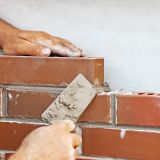In this article:
What is a Masonry Degree?
Degree programs in masonry prepare students to work as masons – tradespeople who build with natural and artificial mineral products like stones, bricks, cinder blocks, and tiles. Coursework covers blueprint reading, pattern layout, constructing corners, aligning structures vertically and horizontally, filling expansion joints, cleaning and polishing surfaces, and the materials used in the trade, with emphasis on concrete and its components – cement, sand, gravel, and water.
In addition, students learn about the different types of masons:
- Brick Masons and Block Masons – these masons are commonly called bricklayers
- Cement Masons and Concrete Finishers – these masons place and finish concrete
- Stone Masons – these masons build stone walls and set stone exteriors and floors
- Terrazzo Workers and Finishers – these masons create decorative walkways, floors, patios, and panels
Program Options
Apprenticeship in Masonry – Three to Four Year Duration
A masonry apprenticeship is the most common educational path. The majority of apprenticeships are provided or sponsored by national and local unions and their affiliates, as well as by non-union contractors. The International Union of Bricklayers and Allied Craftworkers, for example, regularly offers apprenticeships. Generally, each year of a masonry apprenticeship is made up of 144 hours of technical instruction and 2,000 hours of paid on-the-job training.
Certificate / Diploma in Masonry – Six Month to One Year Duration
Certificate programs are offered by technical and vocational schools. Students should choose a curriculum that is made up of in-school hours followed by an apprenticeship.
Here are some samples of coursework included in both school programs and apprenticeships:
Basic:
- Building Equipment Contractors
- Tools and Equipment
- Materials and Safety Equipment
- Engineering, Building, and Safety Codes
- Worksite Preparation
- Acclimatizing the Worksite
- Cleaning and Disassembling the Worksite
- Wall Systems Accessories
- Mortar
- Masonry Unit Preparation
- Job Layout
- Structural Masonry
- Non-structural Masonry
Intermediate:
- Engineering, Building, and Safety Codes II
- Grout
- Job Layout
- Masonry Unit Preparation II
- Materials and Safety Equipment
- Mortar II
- Structural Masonry
- Non-structural Masonry
- Temporary Masonry Supports
- Tools and Equipment
- Wall Systems Accessories II
- Waterproof Below Grade
Advanced:
- Building Equipment Contractors
- Use of Material, Tools, and Equipment
- Use of Material Handling and Safety Equipment
- Engineering, Building, and Safety Codes III
- Temporary Masonry Supports II
- Wall Systems Accessories III
- Mortar III
- Masonry Unit Preparation III
- Job Layout II
- Structural Masonry III
- Non-structural Masonry
- Fireplace and Chimney
- Restoration Masonry
Degrees Similar to Masonry
Building Inspection
Programs in building inspection teach students the skills needed to examine structures and verify that they have been constructed according to building codes and other related laws and regulations.
Carpentry
Carpentry training programs teach the skilled trade of cutting, shaping, and assembling wood for buildings and other structures. Students of the trade learn about the two basic types of carpentry: rough carpentry and finish carpentry.
Other Construction Trades
These trades include drywalling, tile and marble setting, carpet laying, glazing (glass installation), insulation, and ironwork,
Civil Engineering
Civil engineering students learn how to design and plan civil infrastructure like roads, tunnels, bridges, dams, railroads, and airports. Classes include math, statistics, engineering systems and mechanics, and building codes.
Engineering Technology
Engineering technology programs teach the engineering skills required to assist engineers in their work. Common classes are computers for engineering technology, construction methodologies, structural systems, strength of materials, and technical drawing. Some of the subfields of engineering technology are civil engineering technology, construction engineering technology, aerospace engineering technology, and automotive engineering technology.
Welding
Welding students learn the process of joining metals using extreme heat. They study metallurgy, the properties of different types of metals, and different types of welding.
Skills You’ll Learn
After completing their studies and apprenticeship, masonry grads are equipped with these transferable skills:
Physical Strength and Stamina
This is physical work that calls for physical strength and stamina.
Eye for Detail
The work requires attention to specifications and precise measurements.
Color Vision
Some of the work that masons do, such as setting terrazzo patterns, requires that they are able to distinguish between subtle color variations.
Critical Thinking and Troubleshooting Abilities
When they encounter problems, masons must be able to think quickly and critically to come up with solutions.
Math Skills
Math skills are needed to interpret blueprints and calculate sizes, distances, and quantities of material.
Hand-Eye Coordination / Manual Dexterity
Students who study masonry must learn how to apply smooth and even layers of cement to set bricks.
Communication Skills
Clear communication with clients and colleagues is essential to the smooth operation of a project.
What Can You Do with a Masonry Degree?
As masonry is a very specific trade, those trained in it typically work directly in the field. The largest employers of masons are poured concrete foundation and structure contractors and masonry contractors. Masons also find employment with commercial and residential construction companies, as well as with heavy and civil engineering construction firms. Some are self-employed.
Within each of these employment sectors, they lay and finish concrete for other construction trades, including carpenters, floor and carpet layers, tile setters, glaziers, pavers, floor sanders, sheet metal workers, boilermakers, fireplace installers, and landscapers.

